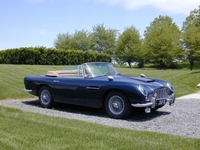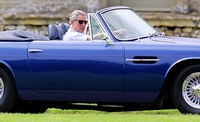When I turned 21 no one gave me a car as a birthday present, although my mother did lend me her ancient Nash Rambler for a few weeks when I was in desperate need of wheels. When Prince Charles celebrated his twenty-first, back in 1969, his mom, Queen Elizabeth, gave him an Aston Martin DB6 Volante Mkll. (I guess that’s one difference between commoners and royalty). Flash forward to April 29, 2011, and if you caught the footage of Prince William taking his new bride out for an impromptu spin in his dad’s car, you saw that it is still a gorgeous machine. Yes, Prince Charles still has his Aston Martin.
bride out for an impromptu spin in his dad’s car, you saw that it is still a gorgeous machine. Yes, Prince Charles still has his Aston Martin.
A few years ago, when the makers of Aston Martin heard that the eco-friendly prince wanted to convert his car to bioethanol (his Jaguars, Audi and Range Rovers have all been converted to run on 100% biodiesel made from used cooking oil), they contacted Green Fuels, a biofuels supplier, for help. According to a report in the Daily Mail, Green Fuels bought 8000 liters of surplus white wine from an English winery. They ran the wine through their distillery, and after boiling off the wine’s 11% alcohol, condensing it and removing any remaining water, Green Fuels was left with hundreds of liters of 99.8% pure ethanol. In a new take on the wine-and-cheese-party theme, the ethanol was topped up with alcohol extracted from fermented whey collected from local cheese makers. The Aston Martin’s carburetors were tweaked to allow more fuel into the engine, and vroom vroom–the car was off and running on a mix of 85% ethanol / 15% petrol. Bioethanol, by the way, is only slightly cheaper than conventional fuel, but is estimated to produce 85% less carbon.
The grapes used for the prince’s fuel had already been fermented into  wine. The winery owners bottle all they can, but since they aren’t allowed to produce more than their EU quota, they sell it to Green Fuels rather than destroy the excess (the Daily Mail article reported that the winery’s owner is “keeping his head down for fear of mobs in search of free plonk”).
wine. The winery owners bottle all they can, but since they aren’t allowed to produce more than their EU quota, they sell it to Green Fuels rather than destroy the excess (the Daily Mail article reported that the winery’s owner is “keeping his head down for fear of mobs in search of free plonk”).
“Anything that contains alcohol can be distilled in the same way you produce vodka and whisky,” explains James Hygate at Green Fuels. “The only waste is fruit juice, and this is sent off to make biogas for electricity.” So, now I’m wondering if my mother’s old Nash might have run better had I topped the tank off with a bottle of Chardonnay….
7
